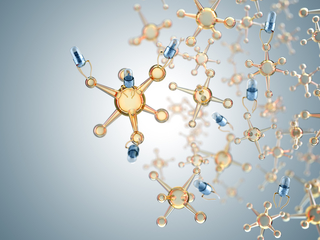Advanced ‘mechano-biology’ sensor to target diseased cells

A team of scientists has embarked on a project to build a new modular sensor
For decades scientists have explored the human body by studying the chemical reactions involved in biological processes, but an upsurge of recent evidence has pointed to the critical role of the mechanical forces driving our cells’ behavior.
A team of scientists led by Yale’s Julien Berro, associate professor of Molecular Biophysics and Biochemistry, and of Cell Biology, has embarked on a project that could transform the study and application of mechanical forces in molecular cell biology.
Their work has received $7.5M from the National Institutes for Health Director’s Transformative Research Award. Part of the High-Risk, High-Reward Research program, the award supports individuals or teams proposing transformative projects that have the potential to create or overturn fundamental paradigms.
Alongside Berro, the collaboration combines expertise from Yale’s Xiaolei Su, associate professor of Cell Biology, and Alexander A. Green, associate professor of Biomedical Engineering at Boston University.
The scientists aim to build a new modular sensor that goes beyond current measurement capabilities to advance the new field of fundamental ‘mechanobiology’.
The reward could yield the first therapeutic strategies informed by mechanical signaling to target mechano-properties of diseased cells and proteins.
Without the nano tools and probes needed to measure how proteins ‘push and pull’, force itself has rarely been exploited as a target for cell engineering and therapeutics development.
The emerging field of nanobiology has lacked the sensors needed to digitally sense mechanical forces, or the genetically encoded devices required to convert force into signals that control our cells.
The scientists aim to meet this need by building a completely new class of sensor.
Moving beyond unwieldly single-purpose tools, they propose to combine state-of-the-art technologies in protein design, RNA synthetic biology, and cell engineering to develop “mechaswitches”: universal, modular and programmable signal transduction systems that are able to trigger specific cellular actions in response to mechanical signals.
“By building modular mechaswitches we aim to equip the field with a toolbox of exchangeable parts to suit the context of experiments, and also manipulate the force between proteins,” said Berro, who is a faculty member at the Yale Nanobiology Institute.
Berro’s lab at Yale’s West Campus is interested in how forces are produced and sensed at the molecular scale in cells.
The scholars anticipate that their mechaswitches will help lay the foundation for the first therapeutic strategies informed by mechanical signals.
The High-Risk, High-Reward Research program supports exceptionally creative scientists pursuing highly innovative research with the potential for broad impact in biomedical, behavioral, or social sciences within the NIH mission.